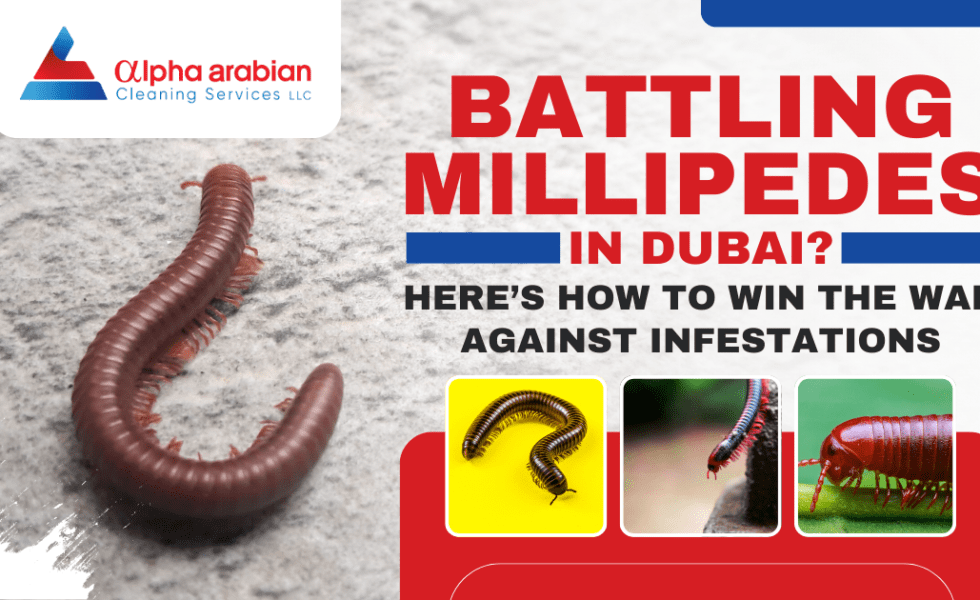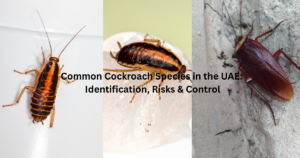Battling Millipedes in Dubai? Here’s How to Win the War Against Infestations
Millipede infestations represent an increasing concern for homeowners in Dubai. While these arthropods are generally harmless to humans, their propensity to invade residential spaces during specific seasons can result in discomfort and inconvenience. Individuals can effectively address millipede invasions using appropriate knowledge and resources and restore their living environments.
This blog explores the causes of infestations, the challenges they bring, and the most effective millipede control solutions to keep your home pest-free.
What Are Millipedes and Why Are They Invading?
Millipedes are small, segmented arthropods with cylindrical bodies and many legs, often called “thousand-leggers.” They serve as decomposers, feeding on decaying organic matter in soil and gardens. However, they may venture indoors when heavy rainfall floods their habitats or during dry spells when they search for moisture.
In late spring and early summer, millipedes often migrate in large groups for mating, which raises the chances of them invading homes. Understanding their behaviour and biology is essential for effectively managing infestations. By recognizing the conditions that drive millipedes indoors, homeowners can take preventive steps to reduce encounters and maintain a pest-free environment.
Signs of a Millipede Infestation
Millipede invasions are often easy to identify through several common indicators. Recognizing these signs earlier can help homeowners take timely action to manage the invasion.
• Visible Clusters: You may notice groups of millipedes near doors, windows, or walls, particularly during rainy or humid weather.
• Odour and Stains: When threatened, millipedes release a foul-smelling fluid that can irritate the skin and may stain surfaces.
• Dead Millipedes Indoors: Dry indoor environments are unsuitable for millipedes, resulting in an unpleasant accumulation of dead insects.
Challenges Posed by Millipede Infestations
Millipedes, while harmless since they do not bite, sting, or carry diseases, can still lead to several issues that warrant prompt management. Their presence, particularly in large numbers indoors, can be highly disturbing and pose a significant inconvenience to homeowners.
Furthermore, millipedes can leave stains on floors, walls, and fabrics, which may lead to property damage. The buildup of dead millipedes and their droppings can also raise hygiene concerns, resulting in unsanitary conditions. It’s crucial to tackle millipede infestations promptly to address these issues and ensure a clean and comfortable living space.
Millipede Control Solutions: Non-Chemical Methods
Controlling millipede infestations effectively begins with preventive, non-chemical strategies that can substantially diminish the chances of an infestation. Implementing a robust millipede control solution starts with these key steps:
• Seal Entry Points: Inspect your home for gaps or cracks around doors, windows, and the foundation. Use caulk or weather stripping to seal these openings and prevent millipedes and other pests from entering.
• Reduce Moisture: Millipedes thrive in damp environments, so managing moisture is essential. Repair leaks quickly, use dehumidifiers in humid areas, and ensure drainage systems efficiently keep water away from your home’s foundation.
• Maintain Outdoor Spaces: A well-maintained garden boosts curb appeal and deters millipedes. Regularly remove debris, trim overgrown plants, and store firewood at least 18 inches off the ground and away from the foundation to create a less inviting environment for these pests.
When to Use Chemical Control Solutions
Chemical treatments can be effective when dealing with severe millipede infestations, making them a viable millipede control solution. One viable option is the use of EPA-approved insecticides like bifenthrin or cyfluthrin. These should be applied strategically around entry points and the foundations of structures. It’s crucial to follow the label instructions carefully to ensure both safety and effectiveness in their use.
You can sprinkle diatomaceous earth around entryways; this natural powder works by dehydrating millipedes. Just be sure to reapply it after rain to maintain its effectiveness. While these chemical treatments can help control infestations, they should be a last resort and used with preventive measures for more sustainable outcomes.
Long-Term Strategies for Millipede Prevention
To combat millipede infestations sustainably, adopt proactive long-term strategies. Regularly inspect your home for cracks that could allow these pests to enter, and seal any potential entry points. Keeping potential entry points sealed helps maintain a barrier against unwanted guests.
Indoor climate control also plays a significant role in prevention. By maintaining a dry environment with adequate ventilation and dehumidifiers, you can deter millipedes from taking up residence. In addition, follow gardening best practices—avoid over-mulching, keep flowerbeds at a safe distance from your home’s foundation, and dispose of organic waste away from your property.
Conclusion: Winning the War Against Millipedes
Millipede infestations in Dubai can be overwhelming, but they are manageable with the right strategies. Understanding their behaviour and addressing the root causes of infestations are crucial steps in controlling these pests. To prevent these unwanted intruders from invading your home, it’s essential to apply effective millipede control methods.
Alpha Arabian Pest Control Service provides expert solutions for eliminating millipede infestations, ensuring a pest-free environment across Dubai. With our professional expertise and eco-friendly methods, we offer reliable solutions to keep your living space pest-free. Contact us today for a consultation and take the first step toward a millipede-free home!





